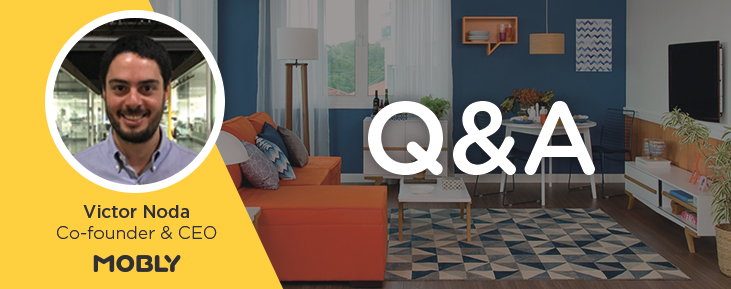Since its inception in 2011, São Paulo-based eCommerce platform Mobly has rapidly grown into a household name for furniture and decorative homeware in Latin America.
Mobly Co-founder and CEO Victor Noda recently spoke with Namogoo’s Director of Field Marketing Lauren Bermudez to discuss how Namogoo revealed the existence of Customer Journey Hijacking, boosted conversion rates and lead to new insights about high-value customers – and to share tips for eCommerce success in the time of Coronavirus.
Lauren: Can you give us an overview of Mobly and how the company has progressed since you started
Victor: We started Mobly in 2011, in Brazil. Since then we’ve grown into the leading online furniture company in Latin America.
Lauren: As a purely eCommerce company, which areas do you identify as key to your success and invest in the most?
Victor: In recent years we focused heavily on growth and profitability. We invested in technology to boost growth and increase efficiency in key aspects of our business, especially marketing. We tried to improve the metrics that affect our profitability, including conversion rates, basket sizes, recurrence… And we’ve been working a lot to understand our customer journey.
Lauren: How did you first learn about Customer Journey Hijacking?
Victor: About two years ago we set up an attribution model to better understand our marketing channels and their impact on sales. As we looked deeper into our data, we noticed something strange — a large number of customers accessing our website from Google and other direct channels were for some reason being marked as originating from affiliates. Some of our affiliates were taking commissions for orders they never brought to the site. We looked for a solution to stop this, and that led us to Namogoo.
During the A/B test with Namogoo, we found out we had a much bigger issue than affiliate hijacking that we were never aware of. It wasn’t just affiliates stealing commissions — our entire customers’ journey was being hijacked. We were able to view screenshots of what our customers were actually seeing — offers from our direct competitors popping up on their screens, redirecting them away from Mobly. We were losing valuable business and didn’t even know it.
Lauren: How long have you been working with Namogoo? Could you tell us about the results you’ve seen?
Victor: We’ve started working with Namogoo for over a year now, and we were really amazed to discover how many of our customers were being hijacked – more than 20%. Not only that, we realized we’re talking about our most valuable customers, with much higher conversion rates and basket sizes than average.
After blocking these injected ads, our conversion rate grew considerably by around 5%. We also saw a similar uptick in all our sales by not losing these customers to Customer Journey Hijacking.
Lauren: Have you tried segmenting and targeting hijacked visitors?
Victor: We started targeting these customers as a segment within our marketing. So far, we tested Google Shopping and Google Ads, text ads, and retargeting.
With Google Shopping for instance, the conversion rate for these customers was 30% higher compared to regular audiences. We also saw a 10-15% increase in basket sizes compared to other segments. Also, our Return on Ad Spend (ROAS) from this segment was 32% higher than our other segments.
After seeing these results we also integrated data for hijacked customers in our Facebook campaigns, and we are seeing click-through rates (CTR) up by 40%, while cost per click (CPC) is down by 36% for this segment.
It makes sense: these customers have a higher conversion rate and basket size than average because they shop online more and visit more eCommerce websites. And that’s why they are affected by these ad injections.
Lauren: What do you most appreciate about working with Namogoo?
Victor: What I like most about Namogoo is that it clearly generates a lot of value. We use many solutions, but we can’t always tell how much revenue they bring. With Namogoo, there’s no doubt that significant value is being created. This is a crucial metric when evaluating a partnership.
We also really appreciate how transparent Namogoo has been. We love that we can use our own data to understand the actual impact of Namogoo. This is one of the most important things in our partners, and with Namogoo it’s been there from day one.
And finally, the Namogoo team is always open to our ideas and willing to develop features we need, run tests, share data and explore new ways to use the technology. We feel they really care about improving our customer journey and the efficiency of our marketing. We appreciate that very much.
Lauren: Now about coronavirus. Do you see a competitive advantage for eCommerce players in the last few months? Do you feel Mobly, a 100% online company, was better prepared?
Victor: Back in March, when coronavirus hit Brazil, the government closed all retail stores. There was an immediate increase in all eCommerce sales. Since then, Mobly sales have grown steadily. The market we operate in is in crisis, many people are jobless or receive lower paychecks, and offline businesses have greatly reduced their product range. That’s the majority of our competition.
As a result, online players now tackle a much larger chunk of the market. Businesses with eCommerce capabilities, the technology and logistics to serve customers countrywide, are able to leverage this situation to increase sales and gain market shares.
Lauren: What measures and strategies did you adopt to navigate Mobly through this crisis?
Victor: We wanted to ramp up business during coronavirus, so we refocused our efforts. We increased our marketing expenses to maximize profitability, while trying to increase our market share. We also started implementing new pricing technology to maximize the margin generated by each visit. In both areas, we’ve focused quite a lot on adding technology to be able to do better segmentations and better AI-based pricing.
Also, we adapted our logistics to make sure everyone stays safe and healthy. At the same time, we tried to maximize our reach, reduce delivery times and shipping costs so that we can offer better shipping prices to our customers.
Lauren: Any tips you would offer to businesses trying to manage the COVID-19 period?
Victor: The best tip I would give is: if your company isn’t operating online, focus your energies on going digital, as fast as you can.
If you’re an online company, when I see the number of players entering the market, it’s more important than ever to differentiate. Be unique: in your value proposition, the products you offer, your platform, your services, how you use technology to maximize conversion rates, recurrence, pricing… If you’re able to do that better than your competitors, you can spend more or smarter than others, and grow your business.



